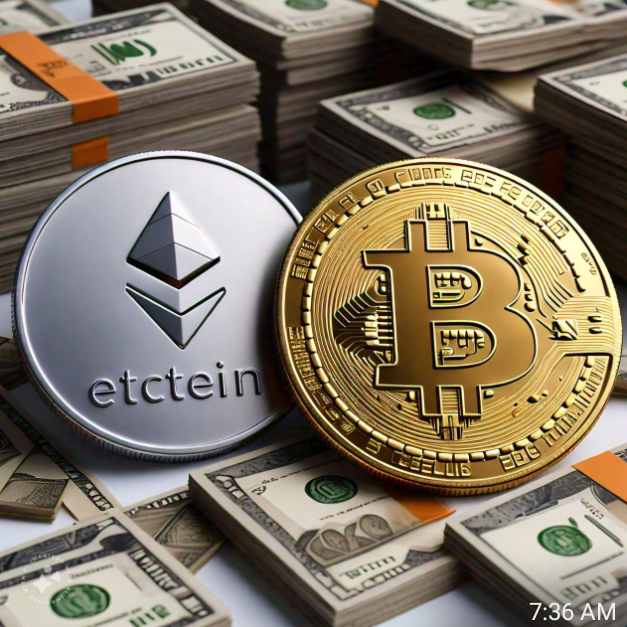ETF Weekly Recap: Bitcoin Gains Momentum as Ethereum Faces Challenges
Introduction: Bitcoin and Ethereum’s ETF Journey
Exchange-traded funds (ETFs) for cryptocurrencies, particularly for Bitcoin and Ethereum, are drawing attention from investors. Bitcoin ETFs have seen significant inflows, while Ethereum ETFs face challenges with outflows. This article explores the weekly performance of Bitcoin and Ethereum ETFs, shedding light on the trends and the implications for the cryptocurrency market.
Bitcoin ETFs Shine with Almost $1 Billion in Weekly Inflows
Bitcoin ETFs attracted nearly $1 billion in new investments this past week, demonstrating investors’ confidence. While Bitcoin ETFs previously saw similar peaks, such as a $2 billion inflow in March, this week highlights renewed interest.
Daily Breakdown of Bitcoin ETF Inflows:
- Monday: $294.3 million
- Tuesday: A slight dip with $79.1 million
- Wednesday: Rebound at $192.4 million
- Thursday: Continued strength at $188 million
- Friday: Surged with $402 million, totaling $997.6 million by week’s end
However, Bitcoin’s price saw fluctuations, starting at $69,500 on Monday, dipping mid-week, and closing at around $67,000, slightly lower than the previous week. This performance suggests investors may be focused on Bitcoin’s long-term potential rather than short-term price gains.
BlackRock’s Dominance in Bitcoin ETFs
BlackRock led the inflow of contributions, adding $329 million on Monday and amassing over $1 billion for the week. This substantial inflow signifies confidence from institutional investors in Bitcoin, setting Bitcoin apart as the primary choice among cryptocurrency ETFs.
Ethereum ETFs Struggle: Facing a Net Outflow
In contrast, Ethereum ETFs experienced a challenging week with a total outflow of $24.6 million. Monday saw a significant outflow of $20.8 million, and while there were minor gains throughout the week, Ethereum ultimately closed with losses on Friday.
Ethereum Price Impact
Ethereum’s price also dropped over 6%, slipping below the $2,500 mark, a reflection of the lower investor confidence compared to Bitcoin.
Why Bitcoin ETFs Are More Attractive to Investors
Bitcoin’s status as a reliable digital asset has earned it the “digital gold” label, drawing both retail and institutional investors seeking stability. The capped supply of 21 million coins adds to Bitcoin’s appeal for those viewing it as a hedge against inflation.
Institutional Confidence in Bitcoin
As the pioneering cryptocurrency, Bitcoin has proven its resilience, attracting more institutional interest due to its track record. This trust and familiarity increase Bitcoin’s desirability as a mainstream investment option via ETFs.
Ethereum’s Struggles: Perceptions and Performance
Ethereum’s utility for smart contracts makes it valuable, but its dynamic nature and complex upgrade path, including Ethereum 2.0, can deter some investors. Network issues, such as high fees, also contribute to its less stable reputation.
Media and Market Perception
Bitcoin’s portrayal as a safer entry to crypto drives its demand, whereas Ethereum’s complexity and developmental hurdles may make it less appealing to conservative investors. This divide in perception impacts the popularity of ETFs for both assets.
Regulatory Factors Impacting ETF Investments
Regulatory clarity is crucial for attracting institutional investments. The U.S. SEC’s approval of Bitcoin ETFs has boosted investor confidence, making Bitcoin ETFs a secure avenue for regulated investment.
Bitcoin’s Regulatory Advantage
With established regulatory support, Bitcoin ETFs offer legal protections that help investors avoid the risks associated with unregulated markets. This clarity allows Bitcoin ETFs to flourish, especially among cautious investors.
Ethereum’s Regulatory Challenges
Ethereum’s diverse applications in DeFi and smart contracts make it harder to regulate. Uncertainties in DeFi regulations have left Ethereum ETFs with fewer regulatory approvals than Bitcoin ETFs. For some investors, this poses additional risks.
Environmental and Policy Considerations
Ethereum’s shift to a proof-of-stake model may reduce environmental concerns, potentially improving its image with regulators and investors. Additionally, emerging regulations, such as the EU’s upcoming cryptocurrency laws, could provide a clearer framework, benefiting Ethereum ETFs in the future.
Growth Prospects for Ethereum ETFs
While Ethereum ETFs face headwinds, several factors could drive future growth. The growing DeFi sector and Ethereum’s pivotal role in it may make it increasingly attractive.
Technological Advancements
Ethereum 2.0’s goal to reduce fees and improve efficiency could renew investor interest. The implementation of Layer 2 solutions, like Polygon, also enhances Ethereum’s scalability, making it more appealing for institutional adoption.
Education and Institutional Interest
Educating investors on Ethereum’s applications in DeFi and tokenization could increase appeal. If Ethereum becomes the platform of choice for real-world asset tokenization, demand for Ethereum ETFs may rise.
Comparing Bitcoin and Ethereum in the ETF Space
The gap between Bitcoin and Ethereum ETFs underscores Bitcoin’s current dominance. Bitcoin’s reputation as a store of value and institutional backing provides a foundation that Ethereum has yet to achieve in the ETF market.
The Future of Ethereum ETFs
Ethereum may close the gap if it addresses key challenges, such as regulatory uncertainties and scalability improvements. The transition to Ethereum 2.0 and the expansion of DeFi could attract institutional support over time.
Cheap Remote Crypto Mining for you – Click Here
Conclusion: Bitcoin Remains Dominant in the ETF Market
Bitcoin and Ethereum ETFs highlight a contrasting narrative in the cryptocurrency market. Bitcoin’s established role as “digital gold” gives it a strong lead, while Ethereum’s versatility has yet to translate into similar institutional demand.
As both assets develop, the ETF landscape may shift. For now, Bitcoin remains the preferred choice for investors, securing its position as a pivotal asset in the cryptocurrency ETF market.


